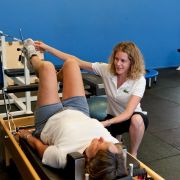
Kegel Balls: A must-hear Interview!
"We're talking Kegel Balls! Yes, Kegel balls or vaginal weights, are more than pleasure toys! They are actually a great tool that allows physios help women to progress pelvic floor muscle strength work in a more functional way, for example when doing physical work like walking and lifting.
Why do we need a strong pelvic floor? The pelvic floor muscle is the muscle that sits at the base of the pelvis. This muscle is responsible for your continence (bladder and bowel leak control), supporting your internal organs and giving pelvic stability. A strong pelvic floor will even give improved sexual function. So you can see, there are lots of reasons to have a good strong pelvic floor.
To listen and learn more click on the play button above.
At Physiologix we have therapists specially trained in womens' health. Please email us from the contact us page or call us on 3511 1112.
Read more information on the health of the Pelvic Floor here!

Womens' Health
At Physiologix, we take women's' health very seriously. We'll give you the proper advice and show you the correct exercises that if done properly, will be a great investment in your future health and well-being as a woman! We have a private, beautifully stocked space full of a wide range of pilates and rehabilitation equipment where we also run small pilates equipment-based classes and individual 1:1 exercise sessions. You will follow an individually designed program, set up specifically for your needs and goals, that will be adjusted and adapted as you progress through your time with us - click here to read more.
Our staff do not do internal assessments but they all use ultrasound on the lower abdominal area so that the pelvic floor can be visualised and assessed. Should there be any concern about your issues, or should you require more in-depth assessment and treatment, your physio will work closely with a women's health physio to ensure we can assist you in moving forward smoothly.
If you experience any of the following symptoms, please don't ignore them. The sooner we see you the better.
- Stress incontinence (leaking when you sneeze or jump)
- Urge incontinence (leaking when you need to go)
- Overactive Bladder (not being able to delay when going to the loo)
- Constipation
- Pain or discomfort with sex
- Pregnancy related pain
- Postnatal pain in any body joint
- Postnatal pelvic floor recovery
- Pre and postnatal excercise prescription
- Prolapse
- Post gynaecological surgery
Contact us now, we can help you!

Body Trashed with Having Babies….Pilates is a Great Solution!
Pilates is a great way to exercise and care for your body. It is a fantastic form of exercise when pregnant and in returning to activity following giving birth.

Womens Health – Come On Girls! Look After Yourselves
50% of women have osteoporosis at 70 years of age. This is compared to men where about a third are affected. Most of this deterioration occurs with changes in oestrogen levels at menopause, where bones lose calcium and other minerals at a much faster rate.
Incontinence And Problems In The Pelvic Floor
 Pelvic floor issues affect many people, yet most of those who experience issues suffer in silence. It may feel embarrassing to ask for help, but there is a wealth of knowledge and skills that can help get you back on track. At Physiologix, physiotherapist Megan Bergman has specific training in the assessment and treatment of pelvic floor problems.
Pelvic floor issues affect many people, yet most of those who experience issues suffer in silence. It may feel embarrassing to ask for help, but there is a wealth of knowledge and skills that can help get you back on track. At Physiologix, physiotherapist Megan Bergman has specific training in the assessment and treatment of pelvic floor problems.

Pelvic floor: Come to the Physiologix Free Seminar and Learn More
Urinary incontinence is a common complaint in women, with reported rates between 32 and 64%. The two most common types of female urinary incontinence are stress incontinence (involuntary loss of urine on effort or physical exertion, sneezing or coughing) and urgency incontinence (loss of urine associated with urgency). Many women present with a mix of the two. Incontinence can affect quality of life and participation in social activities, especially physical activity.










